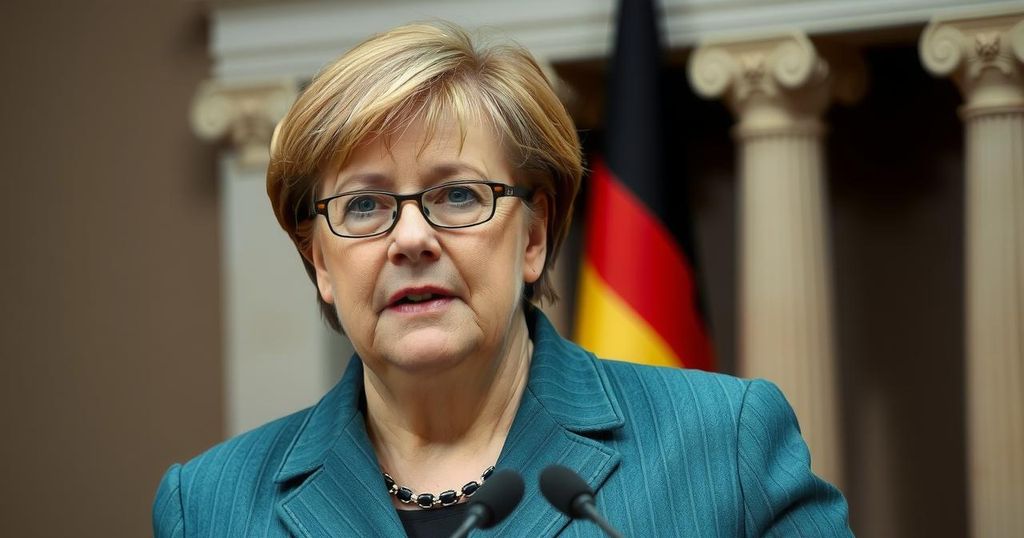Germany Prepares for Early Elections Following Government Collapse and Security Crisis

German President Frank-Walter Steinmeier dissolved parliament and announced an early election on February 23 following the collapse of Chancellor Olaf Scholz’s government. The coalition’s failure stemmed from internal strife over economic recovery strategies, exacerbated by a deadly car-ramming attack that reignited discussions on security and immigration. Polls indicate strong support for the conservative CDU/CSU party, while Scholz’s Social Democrats lag significantly behind.
On Friday, German President Frank-Walter Steinmeier officially dissolved parliament, confirming a new date for the early general election on February 23. This decision follows the collapse of Chancellor Olaf Scholz’s coalition government last month, largely attributed to internal disputes over revitalizing the nation’s economy. Furthermore, recent security concerns, spurred by a tragic car-ramming incident at a Christmas market in Magdeburg, have reignited intense discussions regarding immigration and safety measures in Germany.
In his announcement, President Steinmeier underscored the criticality of “political stability” and called for a respectful and decently conducted campaign. The car-ramming attack, which resulted in five fatalities and injured over 200 individuals, has caused significant public concern. The perpetrator, a Saudi doctor named Taleb al-Abdulmohsen, was apprehended at the scene. Reports indicate that Abdulmohsen harbored “Islamophobic” sentiments, yet his full motives remain ambiguous. In response to the attack, Chancellor Scholz urged citizens to unite against hatred, emphasizing the importance of maintaining social cohesion.
Current polling positions the conservative CDU/CSU party, under the leadership of Friedrich Merz, in the lead with around 32 percent support, followed by the far-right Alternative for Germany (AfD) at 19 percent. The AfD recently hosted a rally in Magdeburg, where their regional leader, Jan Wenzel Schmidt, noted Germany’s need to restrict immigration. Steinmeier expressed his desire for fair and transparent campaign practices, warning against possible foreign interference on social media platforms and reminding political entities that “hatred and violence must have no place in this election campaign.”
Chancellor Scholz’s Social Democrats are polling low at 15 percent, having faced significant instability within his governing coalition, which collapsed on November 6. Steinmeier reiterated the numerous challenges that the next administration will encounter, including economic instability, global conflicts, and immigration issues. On security matters, both the CDU and the SPD advocate for continued support to Ukraine amid its conflict with Russia, while the SPD raises concerns about escalating military involvement.
Furthermore, both major parties aim to address Germany’s economic struggles by revitalizing the “Made in Germany” brand and investing in infrastructure. While the SPD proposes a new public-private investment initiative worth 100 billion euros, the CDU remains steadfast in preserving existing debt restrictions. Regarding climate and energy policies, the SPD is pursuing a green agenda focused on renewable energy, whereas the CDU seeks to counter some of the planned environmental regulations.
In light of recent government instability in Germany, President Frank-Walter Steinmeier’s decision to dissolve parliament marks the necessity for an early election following Chancellor Olaf Scholz’s government’s failure amid internal conflicts. The recent car-ramming attack further intensified existing debates on immigration and national security, placing dramatic pressure on political discourse in the country. Steinmeier’s calls for integrity and decency in the upcoming election reflect a broader desire among German citizens for stability and effective governance in light of various pressing systemic challenges.
In summary, the dissolution of the German parliament sets the stage for an upcoming early election, reflecting significant unresolved issues within the government. As debates around national security, immigration, and economic revitalization intensify following a tragic attack, the political landscape is evolving rapidly. President Steinmeier’s appeal for a respectful campaign and emphasis on political stability highlights the urgent need for a government capable of addressing the multifaceted challenges facing the nation.
Original Source: www.cbs19news.com








